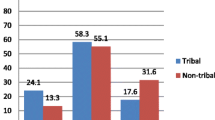Abstract
The role of sociocultural factors such as religion and ethnicity in aiding or hampering family planning (FP) uptake in rural Western Kenya, a region with persistently high fertility rates, is not well established. We explored whether attitudes towards FP can be attributed to religious affiliation and/or ethnicity among women in the region. Findings show that religion and ethnicity have no impact; the most significant factors are level of education and knowledge about the benefits of FP for the mother. FP interventions ought to include strategies aimed at enhancing women’s knowledge about the positive impacts of family planning.
Similar content being viewed by others
References
Addai, I. (1999a). Does religion matter in contraceptive use among Ghanaian women? Review of Religious Research, 40(3), 259–277.
Addai, I. (1999b). Ethnicity and contraceptive use in sub-Saharan Africa: The case of Ghana. Journal of Biosocial Science, 31(1), 105–120.
Agadjanian, V., Yabiku, S., & Fawcett, L. (2009). History, community milieu, and Christian Muslim differentials in contraceptive use in sub-Saharan Africa. Journal for the Scientific Study of Religion, 48(3), 462–479.
Allison, D. P. (1999). Logistic regression using SAS: Theory and application. Cary: SAS Institute Inc.
Bauni, E., Gichuhi, W., & Wasao, S. (2011). Ethnicity and fertility in Kenya. Nairobi: African Population and Health Research Center (APHRC).
Bertrand, J. T., Pineda, M. A., & Santiso, G. R. (1979). Ethnic differences in family planning acceptance in rural Guatemala. Studies in Family Planning, 10(8/9), 238–245.
Blanc, K. A., Wolff, B., Gage, J. A., Ezeh, C. A., Neema, S., & Ssekamatte-Ssebuliba, J. (1996). Negotiating reproductive outcomes in Uganda. Calverton, MD: Institute of Statistics and Applied Economics, Makerere University, Kampala and Macro International.
Browne, L. (2012). What’s religion got to do with it? Islam and fertility in Senegal and Cameroon. Ithaca, NY: (Bachelor’s), Cornell University.
Caldwell, J. C., & Caldwell, P. (1987). The cutural context of high fertility in sub-Saharan Africa. Population and Development Review, 13(3), 409–437.
Coale, A. J. (1986). The decline of fertility in Europe since the eighteenth century as a chapter in demographic history. In A. J. Coale & S. C. Watkins (Eds.), The decline of fertility in Europe (pp. 1–30). Princeton, NJ: Princeton University Press.
Ezeh, A. C. (2001). The influence of spouses over each other’s contraceptive attitudes in Ghana. Studies in Family Planning, 24(3), 163–174.
Gyimah, S. O., Takyi, B. K., & Addai, I. (2006). Challenges to the reproductive-health needs of African women: On religion and maternal health utilization in Ghana. Social Science and Medicine, 62(12), 2930–2944.
Hosmer, W. D., & Lemeshow, S. (2000). Applied logistic regression. Toronto: Wiley.
Iyer, S. (2002). Religion and the decision to use contraception in India. Journal for the Scientific Study of Religion, 41, 711–722.
KNBS. (2009). Kenya Demographic and Health Survey 2008–09. Calverton, MD: Kenya National Bureau of Statistics and ICF Macro.
LoPresti, A. F. (2005). Christianity. In C. Manning & P. Zuckerman (Eds.), Sex and religion (pp. 117–141). Toronto: Thomson Wadsworth.
Lutalo, T., Kidugavu, M., Wawer, J. M., Serwadda, D., Zabin, S. L., & Gray, H. R. (2000). Trends and determinants of contraceptive use in Rakai District, Uganda, 1995–1998. Studies in Family Planning, 31(3), 217–227.
Mburugu, E., & Zulu, E. M. (1998). Trends and correlates of contraceptive use in Kenya. Nairobi: African Population and Health Research Center (APHRC).
Mosher, W. D., & Hendershot, G. E. (1984). Religious affiliation and the fertility of married couples. Journal of marriage and family, 46(3), 671–677.
Murty, R. K., & De Vos, S. (1984). Ethnic differences in contraceptive use in Sri Lanka. Studies in Family Planning, 15(5), 222–232.
Nangendo, S. M. (2012). Knowledge and use of family planning methods and services in West Yimbo Division, Bondo district, Western Kenya. African Study Monographs, 33(4), 233–251.
Nuwaha, F., Faxelid, E., & Hojer, B. (1999). Predictors of condom use among patients with sexually transmitted diseases in Uganda. Sexually Transmitted Diseases, 26(9), 491–495.
Odimegwu, C. O. (1999). Family planning attitudes and use in Nigeria. International Family Planning Perspectives, 25(2), 86–91.
Poston, L. (2005). Islam. In C. Manning & P. Zuckerman (Eds.), Sex and religion (pp. 181–197). Toronto: Thomson Wadsworth.
Schenker, J. G. (2000). Women’s reproductive health: Monotheistic religious perspectives. International Journal of Gynaecology and Obstetrics, 70, 77–86.
Schenker, J. G., & Rabenou, V. (1993). Family planning: Cultural and religious perspectives. Human Reproduction, 8(6), 969–976.
Srikanthan, A., & Reid, R. L. (2008). Religious and cultural influences on contraception. Journal of Obstetrics and Gynaecology Canada, 30(2), 129–137.
Acknowledgments
PWKP is financed by the David and Lucile Packard Foundation. The authors are grateful to the Partnerships for Maternal, Newborn, and Child Health (PAMANECH), Evidence to Action (E2A) and PWKP Projects at the African Population and Health Research Center for supporting our work.
Author information
Authors and Affiliations
Corresponding author
Rights and permissions
About this article
Cite this article
Bakibinga, P., Mutombo, N., Mukiira, C. et al. The Influence of Religion and Ethnicity on Family Planning Approval: A Case for Women in Rural Western Kenya. J Relig Health 55, 192–205 (2016). https://doi.org/10.1007/s10943-015-0030-9
Published:
Issue Date:
DOI: https://doi.org/10.1007/s10943-015-0030-9




